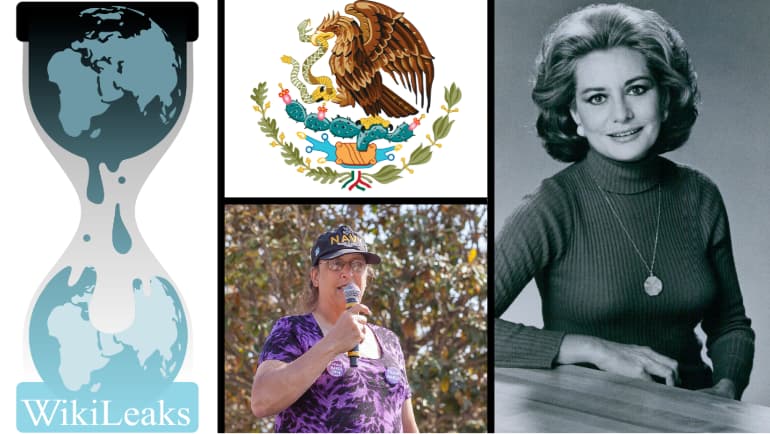Check out This Day in History for Oct. 4, MainStream’s daily look at significant progressive, intersectional historical events.
1537: At a time when translating the Bible into English without the official approval of the Catholic Church was illegal in England, historian John Rogers used the psuedonym Thomas Matthew to publish the first translations of the Bible completed by martyr William Tynsdale, who had been burned at the stake in 1525 for his anti-Catholic English translations of the Bible.

Above, the WikiLeaks logo, Mexico’s coat of arms, trans’ flag creator Monica Helsm, and Barbara Walters.
1712: Utrecht, in the Netherlands, banishes poor Jews from the entire province, in the aftermath of the Great Northern War Plague that many blamed on people of Jewish descent. It was one of many times in history when Jews were blamed for disease.
1824: Mexico becomes a republic after defying Spanish colonial rule for 10 years.
1864: The New Orleans Tribune, America’s first Black newspaper, begins publication and continues for the next six years. It was published in both English and French by Dr. Louis Charles Roudanez, who also distributed a copy of each edition to every member of Congress.
1976: Barbara Walters becomes the first woman co-anchor of an evening news program.
1999: Navy veteran Monica Helms creates the Transgender Pride Flag. choosing the colors of light blue and pink to represent male and female, and white to represent the nonbinary or intersex.
2006: Julian Assange founds WikiLeaks, the nonprofit publisher of classified or restricted “leaks” of government information.
2021: Facebook, Instagram and WhatsApp all experience an unprecedented worldwide blackout for six hours caused by a a maintenance command that unintentionally disconnected Facebook’s data centers from the internet.
2023: The Colombian army apologizes for the murder of more than 6,400 mostly male civilians between 2002 and 2008, by knowingly and falsely identifying them as terrorists to bolster their appearance of success in defying the Revolutionary Armed Forces of Colombia dissident organization known for engaging in kidnapping and narcotics trafficking. The Army members admitted to luring people from poor neighborhoods around the Colombian capitol of Bogotá with the promise of work, then executing them, dressing their bodies in guerilla clothing and accessories post-mortem.

